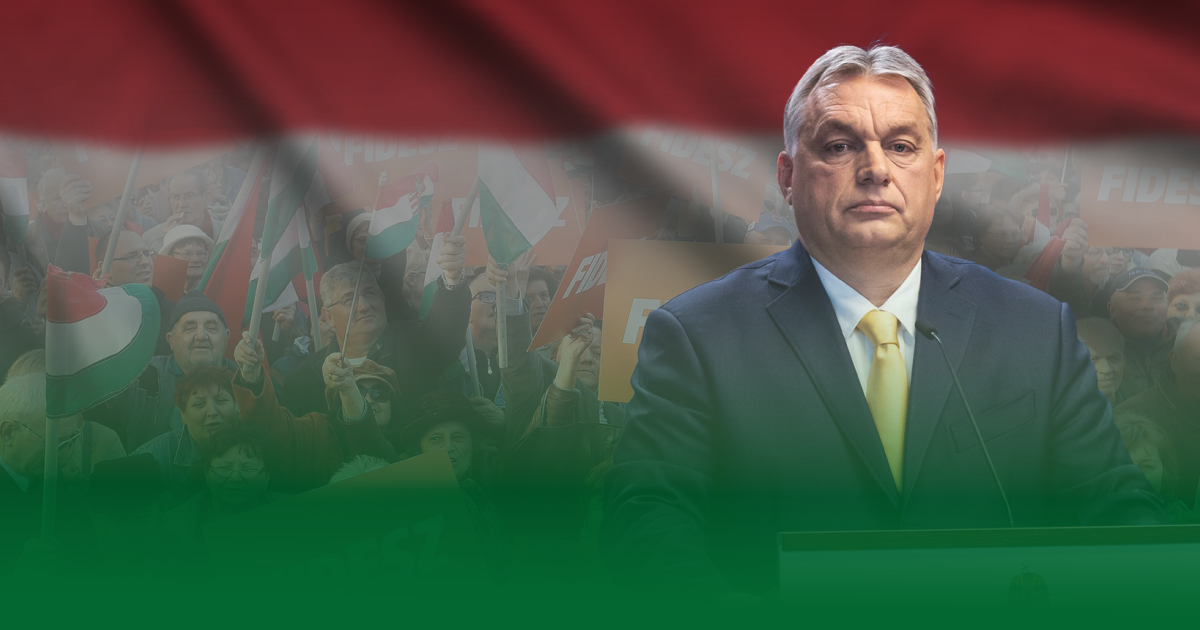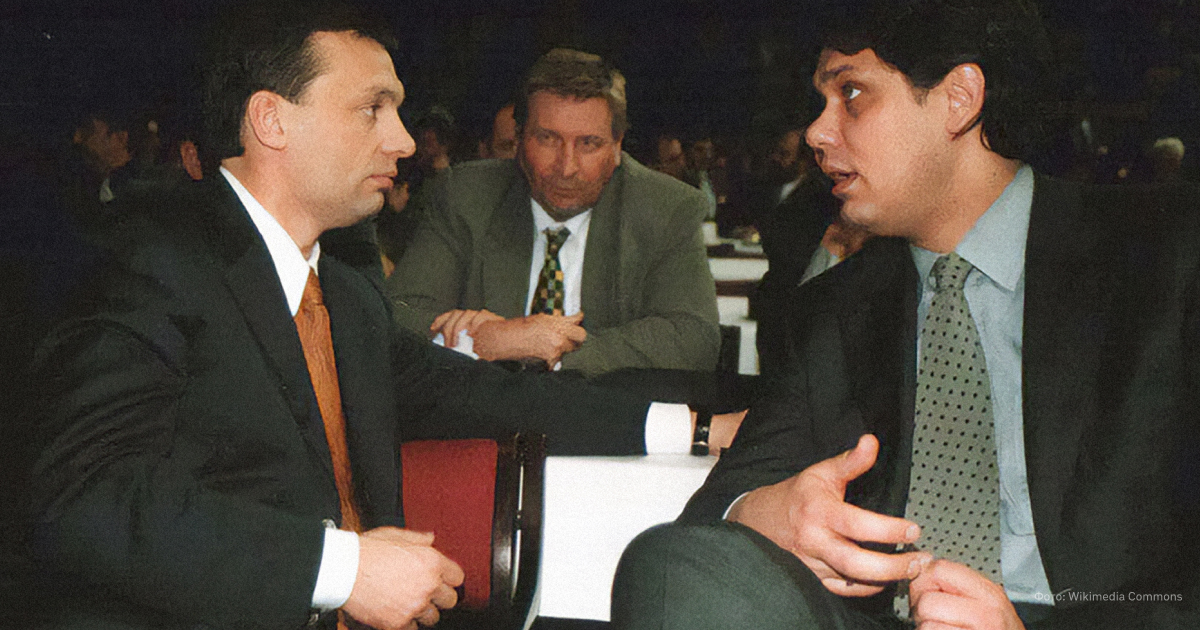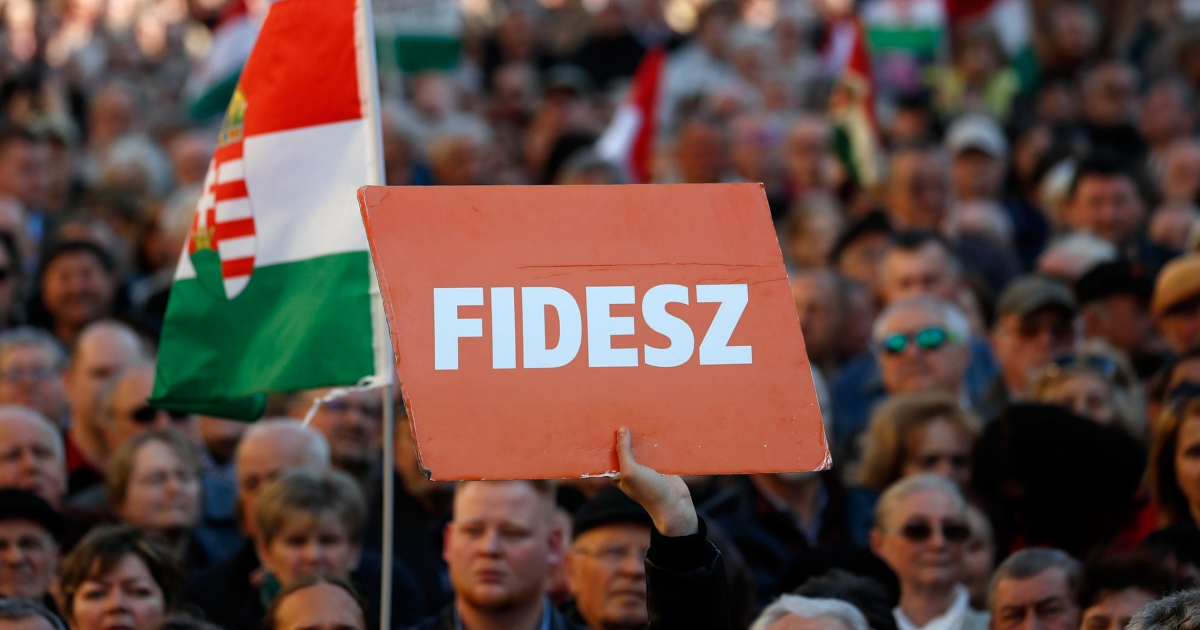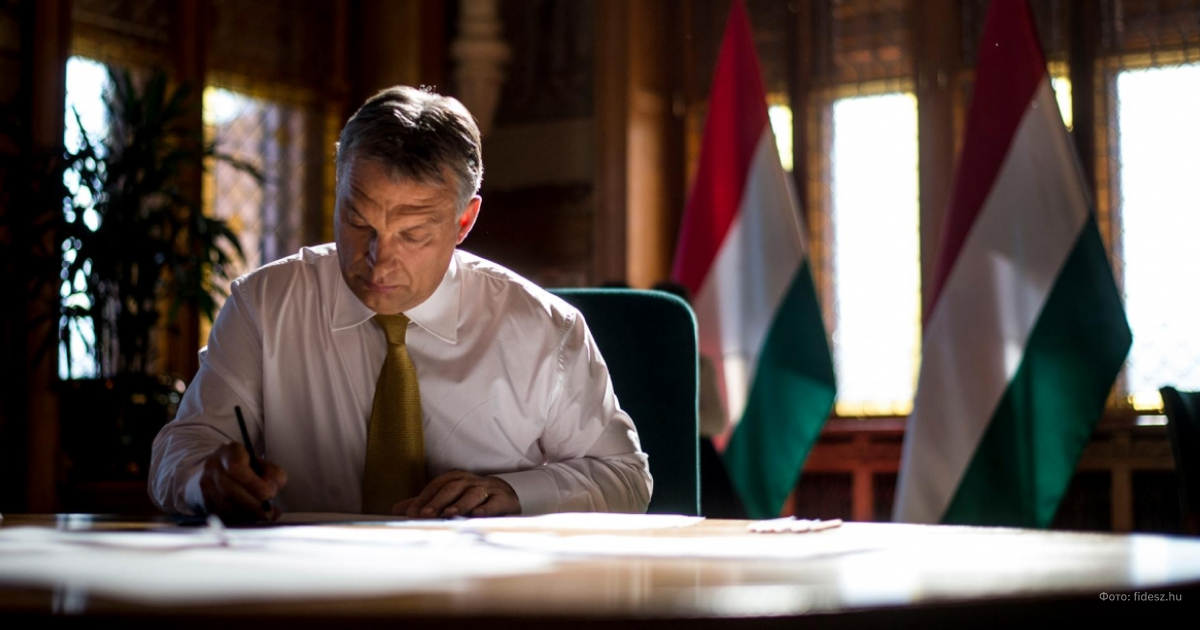From the struggle against communism to proto-authoritarianism: Hungarian Fidesz party history

The Fidesz party played a significant role in the history of modern Hungary. It was one of the most influential liberal democratic movements of resistance to the communist regime in the late 1980s. Nowadays, Fidesz is associated with corruption scandals, conservative views and pro-Russian statements.
The article tells about the Fidesz party foundation and its metamorphosis on the way to power.
Chronology
On March 30, 1988, students at the University of Budapest founded Fidesz, an independent youth organisation. The acronym stands for Fiatal Demokraták Szövetsége (Alliance of Young Democrats). In April that year, Fidesz held its first rally in Budapest, attended by around 400 people. The organisation planned to hold its first congress in the autumn.
In October, Fidesz adopted its statute, elected a temporary council and set up other bodies. According to the statutes, members of the organisation could not be older than 35 years. The organisation also submitted a petition to parliament demanding that March 15, the anniversary of the Hungarian Revolution and War of Independence of 1848-49, be reinstated as a national holiday. The communist parliament approved the motion.
In October 1989, the Hungarian Communist Party changed its name to the Hungarian Socialist Party. During four days, from October 16 to 20, the Hungarian parliament introduced almost 100 amendments to the Constitution, which provided for multi-party parliamentary elections and direct presidential elections.

Hungary became a democratic republic through legislation. The first democratic elections to the new, multi-party parliament were scheduled for March 1990. Fidesz immediately announced that it would participate as a political party.
The party won 6% of the vote and entered the parliament as an opposition party. The winner was the Hungarian Democratic Forum, a centre-right, Christian Democratic party.
Local elections in September of that year brought even more success for Fidesz. The party was elected in 15 towns and two districts of Budapest. Support increased dramatically, and this demanded change.
So, the third congress of the party was held in 1993. It lifted the age limit, changed the ideology from libertarian to centrist, and introduced a new governing body, the Presidium, with Viktor Orbán as its head.
In 1994, Fidesz won over 7% of the vote in the second parliamentary election. The Socialist Party of Hungary won. The party leadership considered the result unsatisfactory and looked for ways to reach out to the electorate.
In 1995, the party merged with the Hungarian Democratic Forum to form a centre-right, conservative alliance against the Hungarian Socialist Party. It worked — in 1998, Fidesz won the election with almost 30% of the vote. Viktor Orbán became prime minister.
The party spent its first term in power strengthening international relations. The country continued its course towards joining the European Union, together with the Visegrad Group, an association of four Central European countries (the Czech Republic, Hungary, Poland, and Slovakia). In 1999, Hungary joined NATO.
In 2002, Fidesz lost the election to the Socialist Party of Hungary - 41% to over 42%. This forced the party to change again. The focus is now on criticising the socialist government, running for the European Parliament and adapting the conservative platform.
Fidesz joined forces with conservative parties and, in 2005, announced an alliance with the Christian Democratic Party. In 2006, it won the local elections with 88% of the vote in most districts except Budapest. However, Fidesz's alliance of right-wing parties lost the parliamentary elections to the Liberals and Socialists.
In 2006, Hungary's political scene was shaken to a greater extent than ever since democratisation. Prime Minister Ferenc Gyurcsány of the Hungarian Socialist Party gave a speech on the country's economic situation. The speech was supposed to be confidential, but the media obtained the audio recording.
In the speech, Gyurcsány said that the Hungarian Socialist Party had deliberately lied to its voters for 18 months about the economic situation in the country to win the 2006 elections. In fact, the country's economy was in a pre-crisis state, and the government was preparing for austerity measures.
Protests shook the country. Hungarians demanded the resignation of the minister and early elections. Fidesz led the protest movement. Orbán called the prime minister a "liar" and refused to negotiate with the authorities, saying that "Hungary cannot be held hostage by one person", i.e. the prime minister, Viktor Orbán, said.
Ferenc Gyurcsány did not resign, remaining in office until the end of his term and the next parliamentary elections. The Hungarian Socialist Party split closer to the 2010 parliamentary elections. Fidesz won the local elections in 2006 and the European Parliament elections in 2009 with over 56% of the vote.
"Until 2006, Fidesz had been a liberal party. But after losing the elections to the Socialists in 2002, the party took a turn towards authoritarianism, still present today. In 2002, Fidesz began forming an inter-party association called Fidesz - Christian Democratic Party. Now they control the entire Christian Democratic movement in Hungary," explains Tibor Tompa, head of the Hungarian community in Kyiv, in a comment to Svidomi.
In the 2010 parliamentary elections, Fidesz won more than 52% of the vote, allowing it to make decisions in the parliament unilaterally. To retain power and quickly integrate its programme, the new conservative Hungarian parliament launched constitutional and judicial reforms and created a new media regulator to control all media in the country. The Prime Minister, Viktor Orbán, was given the right to choose the head of the regulator.

After the HSP collapse and the opposition's fragmentation, the media became the main opposition force for Fidesz. Therefore, the parliament introduced a new media law: Reports "unbalanced or offensive to human dignity or general morality" are subject to a fine; journalists are obliged to "promote national identity".
Public broadcasters, such as Hungarian Public Radio, were given new managers. Newsrooms were "purged" of journalists who covered "unacceptable" such issues as climate change and immigration.
In 2018, more than 400 media outlets of various types were merged into one holding company under the management of the Central European Press and Media Foundation. Orban claimed that 'left-wing media was in the majority' in Hungary and that the newly created foundation was 'of national interest because it was non-profit'.
The situation was unprecedented for an EU member state. The work of the media watchdog and direct instructions from the government were among the reasons for the European Parliament to suspend voting rights and impose sanctions.
Domestically, however, Fidesz has been winning parliamentary and local elections, continuing the party's conservative direction. The party won the parliamentary elections in 2014, 2018 and 2022.
In the 2019 local elections, the party lost only Budapest but won a majority in other districts. Tibor Tompa explains this gap by the fact that the capital has a concentration of intellectual and educated elites, while the regions are more religious.
"The electorate of Fidesz is mainly provincial, monolingual, poorly educated residents. Two million Hungarians, mostly residents of Budapest, voted against them. But Fidesz has the support of more than 50% of Hungarians," he says.
Ideology
In the first elections, Fidesz ran as a liberal party with elements of left-wing ideas in its programme. They tried to win over the former Communist Party voters. But by 1994, the party had already changed its ideology to a centrist one, leaning towards conservatism and nationalism.
The first decision to change ideology was taken by Viktor Orbán when he became head of the party's presidium. Although this decision did not bring victory in the parliamentary elections, it proved successful in the long run.
While in opposition from 2002 to 2010, Fidesz criticised socialist ideas and liberal economics and countered them with state control of critical industries, foreign investment restrictions, and low corporate sector taxes.
In 2010, Fidesz came to power and implemented its programme. After the global economic crisis of 2008, Hungary had to emerge from recession, so it began introducing state control over healthcare and education, partial isolation of the banking system from transnationals, and a review of its external debt.
Fidesz's policies expressed the ideas of Euroscepticism, anti-immigration policies and Hungarian nationalism. One example of such a policy is the citizenship programme for ethnic Hungarians born in the neighbouring countries of Romania, Slovakia and Ukraine. This has helped Hungary gain over a million new citizens, and Fidesz has gained about 10% of its electorate.
The head of the Hungarian community in Kyiv explains that Fidesz has created a whole supra-party system, which influences all spheres of life.
"This is a social contract between the government and society. The vast majority of the Hungarian media is not only under the influence of Fidesz but also under its leadership. 23 out of 25 universities are run by Fidesz party officials affiliated with Orbán. So there is nothing to be surprised by what is happening in Hungary,"
says Tibor Tompa.
With the development of conservative ideas, Fidesz also began to rely on the church as part of its political ideology. In his criticism of liberal democracy, Orbán contrasted it with Christian democracy. He claimed that Christian democracy rejects multiculturalism and immigration, is anti-communist and upholds Christian values.
He also cited Russia and Türkiye as successful examples of illiberal countries. "Christian democracy is not liberal," said Orbán.
Fidesz is now seen as a right-wing populist party. The party integrates conservative ideology into its political programme, from economic and legal regulations to the style of governance. Although Hungary is a parliamentary democracy, Viktor Orbán has consolidated power in his hands. He governs from the position of an authoritarian leader who decides national issues on his own.

Orbanology
Orbán was one of the founders of Fidesz in 1988. He became leader of the party in 1993 and was one of the driving forces behind the ideological change, replacing the liberal ideology with a centrist one.
After losing the 2002 elections, Orbán stepped down from the leadership but remained in Fidesz. He returned in 2009 when his predecessor, László Kövér, stepped down as chairman of the party's presidium.
In the same year, Fidesz finally became a conservative and right-wing party, distancing itself from the ruling Socialist Party and uniting smaller right-wing parties as the Hungarian Democratic Union.
Criticism of the ruling party and proposals to completely change the country's development vector helped Fidesz and Viktor Orbán to power.
Orbán has been prime minister for four consecutive terms.
Just as he concentrated power in the party, Orbán began to consolidate power in Hungary. First, in 2011, the new parliament changed the constitution. The constitutional court's powers were curtailed, and the nomination committee, which consisted of representatives of all parliamentary parties, was dissolved. The government also lowered the retirement age from 70 to 62, forcing judges to resign and creating vacancies for new appointments.
The Venice Commission condemned the constitutional changes and restrictions on the country's judiciary, but the Hungarian government did not amend the legislation.
In 2017, the parliament passed a law imposing strict restrictions on NGOs receiving foreign funding. Such organisations had to register as 'foreign-funded' and disclose information about their donors or face closure.
The legislation is reminiscent of a law passed in Russia in 2012 that requires organisations that receive foreign funding to register as "foreign agents".
Local and international NGOs have criticised the law. John Dalhuisen, Director of Amnesty International, said the Hungarian authorities were discrediting NGOs and obstructing their work.
Parliament did not amend or withdraw the law. Viktor Orbán explained that the law aimed to increase transparency and combat money laundering and terrorist financing.
In 2018, the European Parliament voted in favour of a proposal to suspend Hungary's voting rights due to violations of democratic law and EU values. The European Parliament sent an official warning for violating EU values and warned of possible sanctions against the country if it continues to violate EU law.
All 28 EU members had to ratify the decision unanimously, but Poland failed. Hungary retained its voting rights, but the European Commission began imposing sanctions.
In 2021, it froze Hungary's €7.5 billion regional fund. In 2022, it reduced the funding to €6.3 billion, more than 3% of the country's GDP. The European Commission also froze access to the Recovery Fund, a unique financial facility to support the economies of EU member states affected by the COVID-19 pandemic.
"Viktor Orbán has a negative attitude towards European values and institutions. The only way to influence him is through financial sanctions from the European Union and the total isolation of Fidesz. Hungary is a poor country, and freezing subsidies will affect its economy," said Tibor Tompa.
Fidesz was one of the driving forces behind the new, democratic Hungary in the late 80s. The decision to change its ideology to centrist and then conservative was linked to a political struggle with opponents. But once in power, Fidesz centralised the country's leadership. Orbán, who led the student protest movement against the communist regime, is now violating democratic norms.
"Although Hungary was a democratic country, there was a revolution in 1956. The country fought against communism, but the years of lack of freedom and the absence of civil society left their mark on the country. That's why Fidesz and Orbán managed to win,"
concludes Tibor Tompa.
But he is confident that the country can survive without Fidesz. According to Tibor Tompa, change in the country should come from grassroots initiatives, not opposition politicians or parties.
Representatives of the Hungarian intelligentsia (university professors, cultural and media figures, and church representatives) are already creating Freedom Circles — meetings to discuss the state of society and democracy in the country. Their popularity is increasing.


